|
|
|
Sort Order |
|
|
|
Items / Page
|
|
|
|
|
|
|
| Srl | Item |
| 1 |
ID:
118145


|
|
|
| 2 |
ID:
138454
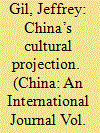

|
|
|
|
|
| Summary/Abstract |
China’s re-emergence as a great power will depend largely on its ability to create a favourable external environment. In order to create this environment in the 21st-century world, China must use its power resources in ways suitable for engaging with and gaining the support of the diverse range of actors that now make up the world political system. As such, China has increasingly emphasised the use of its power resources for attraction, appeal, persuasion and co-option. Culture is regarded as an especially useful resource for such purposes, and China has been actively promoting and projecting elements of Chinese culture throughout the world. This article aims to map and evaluate China’s cultural projection, with a particular focus on its Confucius Institute (hereafter CI) project. It uses academic literature, media reports, internet documents, interviews with people involved in or with an interest in the CI project, interviews with Chinese-language teachers, and a survey of Chinese-language students’ views in order to argue that while the CI project has reached much of the world and conducted numerous activities in a short space of time, its contribution to crafting China’s desired external environment has been somewhat uncertain and limited.
|
|
|
|
|
|
|
|
|
|
|
|
|
|
|
|
| 3 |
ID:
176139
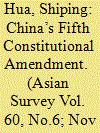

|
|
|
|
|
| Summary/Abstract |
The policy orientations reflected in the fifth amendment to China’s constitution combine some elements of Maoism (an emphasis on ideology, the party, and personality cult); some of the constitutional formality of the Republican era (1912–1949), such as Sun Yat-sen’s Wuquan Xianfa (Five Powers Constitution); and some elements of the legal tradition of China’s imperial past. These policy orientations were justified by a Maoist philosophical voluntarism: the relative detachment between the “economic base” and the “superstructure” justified the persistence of the Chinese cultural tradition and the notion that political reform does not have to accompany economic reform. On those areas that do not represent an imminent threat to the regime, such as economics and law in general, the fifth amendment is purposely vague, to give the regime flexibility in policymaking.
|
|
|
|
|
|
|
|
|
|
|
|
|
|
|
|
| 4 |
ID:
143554
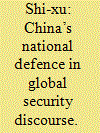

|
|
|
|
|
| Summary/Abstract |
China’s ascendancy in general and its military growth in particular have engendered mixed reactions the world over. This article takes up international academic discourse on China’s national defence and examines the ways in which recurring themes of China as a ‘regional threat’, ‘hostile East Asian power’, and as ‘untrustworthy’, as well as proposals of counter-strategies, are constructed in a case of an international journal publication. Proceeding from Cultural Discourse Studies (CDS), and especially the notion of rhetoric as morally oriented, the article shows that the ‘dangers’, ‘threats’ and ‘untrustworthiness’ of China are born, not out of presentations of facts or evidence, but out of particular rhetorical renderings of Western binary thinking and presumptions of ‘USA-as-guarantor-of-world-peace’ and ‘power-as-hegemony’. Further, it critiques from a CDS perspective the cultural bias and human consequences of these ways of thinking and speaking. The article ends with suggestions for culturally new ways of thinking and talking about the cultural Other and international relations more generally.
|
|
|
|
|
|
|
|
|
|
|
|
|
|
|
|
| 5 |
ID:
160139
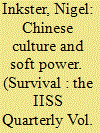

|
|
|
|
|
| Summary/Abstract |
China’s spiritual gap has to date largely been met by a combination of Christianity and traditional Chinese belief systems. Both present challenges to the Communist Party.
|
|
|
|
|
|
|
|
|
|
|
|
|
|
|
|
| 6 |
ID:
140135
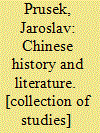

|
|
|
|
|
| Publication |
Holland, D Reidel Publishing Company, 1970.
|
| Description |
586p.hbk
|
|
|
|
|
|
|
|
|
|
|
|
Copies: C:1/I:0,R:0,Q:0
Circulation
| Accession# | Call# | Current Location | Status | Policy | Location |
| 006934 | 951/PRU 006934 | Main | On Shelf | General | |
|
|
|
|
| 7 |
ID:
082543
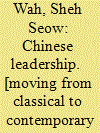

|
|
|
|
|
| Publication |
Singapore, Times Editions, 2003.
|
| Description |
x, 174p.Pbk
|
| Standard Number |
9812325484
|
|
|
|
|
|
|
|
|
|
|
|
Copies: C:1/I:0,R:0,Q:0
Circulation
| Accession# | Call# | Current Location | Status | Policy | Location |
| 052132 | 658.4092/WAH 052132 | Main | On Shelf | General | |
|
|
|
|
| 8 |
ID:
048419
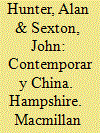

|
|
|
|
|
| Publication |
Hampshire, macmillan Press, 1999.
|
| Description |
xiii, 226p.hbk
|
| Standard Number |
0312221460
|
|
|
|
|
|
|
|
|
|
|
|
Copies: C:1/I:0,R:0,Q:0
Circulation
| Accession# | Call# | Current Location | Status | Policy | Location |
| 041389 | 951.059/HUN 041389 | Main | On Shelf | General | |
|
|
|
|
| 9 |
ID:
140425
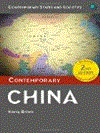

|
|
|
|
|
| Edition |
2nd ed.
|
| Publication |
London, Palgrave, 2015.
|
| Description |
xviii, 236p. : ill., map, abbre.pbk
|
| Series |
Contemporary States and Societies Series
|
| Standard Number |
9781137510099
|
|
|
|
|
|
|
|
|
|
|
|
Copies: C:1/I:0,R:0,Q:0
Circulation
| Accession# | Call# | Current Location | Status | Policy | Location |
| 058293 | 951/BRO 058293 | Main | On Shelf | General | |
|
|
|
|
| 10 |
ID:
189229
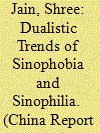

|
|
|
|
|
| Summary/Abstract |
The People’s Republic of China has invited both fascination and fear, admiration and contempt in the last few years. Various public opinion surveys’ data findings reveal a nuanced and conflicted phenomenon of ‘Sinophobia’ and ‘Sinophillia’ across the world nations. One view of China is that of an ‘autocratic,’ ‘anti-democratic’ regime provoking anxiety and suspicion reflected in a trending wave of anti-China sentiments evolving into ‘Sinophobia,’ with its prevalence and intensity highlighted in increasing cases of racism and violence towards immigrant Chinese after the novel coronavirus outbreak. The growing intensity of Sinophobia is noticed in countries witnessing a barging influx of Chinese investment with Chinese land grabs and the loss of native jobs. However, another view is of a nation that inspires vast admiration for its economic ascent and traditional culture. Today, China has an increasing appeal and attraction not just for its economic engagement but also for its culture, language and tourism.
|
|
|
|
|
|
|
|
|
|
|
|
|
|
|
|
| 11 |
ID:
045470
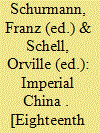

|
|
|
|
|
| Publication |
London, Penguin Books, 1967.
|
| Description |
xxix, 298pHbk
|
| Series |
China Readings
|
|
|
|
|
|
|
|
|
|
|
|
Copies: C:1/I:0,R:0,Q:0
Circulation
| Accession# | Call# | Current Location | Status | Policy | Location |
| 001789 | 951.033/SCH 001789 | Main | On Shelf | General | |
|
|
|
|
| 12 |
ID:
139971
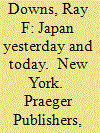

|
|
|
|
|
| Publication |
New York, Praeger Publishers, 1970.
|
| Description |
xv, 256p.hbk
|
| Series |
George School Readings on Developing Lands
|
|
|
|
|
|
|
|
|
|
|
|
Copies: C:1/I:0,R:0,Q:0
Circulation
| Accession# | Call# | Current Location | Status | Policy | Location |
| 004326 | 952/DOW 004326 | Main | On Shelf | General | |
|
|
|
|
| 13 |
ID:
130301


|
|
|
| 14 |
ID:
114686
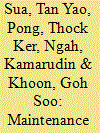

|
|
|
|
|
| Publication |
2012.
|
| Summary/Abstract |
This paper surveys the roles of seven Chinese associations in Kuala Terengganu in maintaining and propagating Chinese culture within a Malay state. These associations have played significant roles in maintaining and propagating Chinese culture as far as the range of cultural activities hosted by them is concerned. There is also a reasonable level of state cultural leadership, though lacking in certain areas. But the small population and the outflow of the younger generation have presented a host of problems to the Chinese associations with regard to the required critical mass, pool of talent, injection of ideas and second-tier leadership. The lack of financial support is yet another problem arising from the peripheral role of the Chinese in the state economy and their small numbers. Meanwhile, leaders of the Chinese associations exercise restraint so as not to infringe on Malay religious sensitivity when hosting outdoor cultural activities during the Muslim ritual periods. They also exhibit a high degree of tolerance towards Islamisation programmes undertaken by the state as long as these programmes do not encroach into their private socio-cultural domains. Despite their small population, the Chinese in Kuala Terengganu are a politically significant minority as a result of the political outbidding among the Malays. Leaders of the Chinese associations have benefited from such a position in resolving certain long-standing cultural issues.
|
|
|
|
|
|
|
|
|
|
|
|
|
|
|
|
| 15 |
ID:
192510
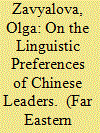

|
|
|
|
|
| Summary/Abstract |
Chinese leaders have been attuned to language issues for centuries. In his speech at the 20th CPC Congress, Xi Jin-ping mentioned the continued promotion of the Putonghua official language and the standard Chinese character writing system as the main task of the country's language policy. Promoting traditional culture and preserving ancient written texts is another important task in modern China. It is no coincidence that soon after the 20th Congress, Xi Jinping visited excavations and a museum park at Yinxu, the site of the capital of the second period of the Shang-Yin Dynasty, where the most ancient jiaguwen Chinese inscriptions have been discovered. In the current period of revival of philological traditions, Xi Jinping's signature in his own calligraphic version with the traditional, non-simplified character 習 xí is widely used in Chinese propaganda. The importance of popularizing Chinese language and culture outside the country was discussed in a letter that Xi Jinping sent to a group of students from Saudi Arabia soon after the 20th Congress. As for the Hanyu Pinyin romanization system for Standard Mandarin Chinese, introduced in the PRC in 1958 - it is either positioned in official documents as an auxiliary means to be used in Chinese primary schools for writing Chinese words in foreign language texts and teaching Chinese to foreigners, or it is not mentioned at all.
|
|
|
|
|
|
|
|
|
|
|
|
|
|
|
|
| 16 |
ID:
179781
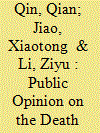

|
|
|
|
|
| Summary/Abstract |
Mainland China and Taiwan are two significant regions currently executing the death penalty; especially, Mainland China alone is believed to implement an amount of executions even larger than the total of all other countries. However, although Mainland China and Taiwan share the Chinese language, as well as traditional culture, the public’s opinions on the death penalty diverge. There is no evidence showing that more people are becoming abolitionists, albeit different social groups, domestic and overseas, are trying to propel the process of abolitionism. The public’s opinions on the death penalty are highly influenced by various factors, including cultural and historical ones, which are considered to be fundamental. Besides, the media, the public’s confidence in the judicial system, nationalism and international pressure also impact the public opinion. The governments of both Mainland China and Taiwan should take further actions in terms of the judicial system.
|
|
|
|
|
|
|
|
|
|
|
|
|
|
|
|
| 17 |
ID:
118933
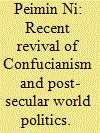

|
|
|
| 18 |
ID:
092202
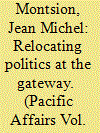

|
|
|
|
|
| Publication |
2009-2010.
|
| Summary/Abstract |
Over the past 20 years, Singaporean state authorities have increasingly presented the city-state as a gateway between East and West. In the education sector, the Global Schoolhouse project represents a state platform for the gateway concept. It functions as a strategic business project that allows for state authorities to not only profit from the international education business but to meet national objectives, notably in terms of recruiting foreign talent to fuel local industries. As part of Singapore's move towards biculturalism, the Global Schoolhouse platform tends, however, to limit state understanding of Chinese culture in Singapore, which is becoming gradually more China-centric and homogenous. In light of Michel de Certeau's work, it is my contention that new light can be shed on Singapore's Global Schoolhouse based on how people in their everyday lives appropriate and contest this state construction of a gateway. By sharing the stories of two individuals involved in Singapore's Global Schoolhouse, it will be stressed that the significance of gateway initiatives in international matters can be better framed through the particular trajectories of people living at the gateway. In their everyday lives, people connect state initiatives to various transnational and local social processes no matter what the state objectives may be. They give particular meaning to initiatives like the Global Schoolhouse and show us how they relate to other dimensions of their lives, notably by incorporating them into transnationalized household strategies of survival.
|
|
|
|
|
|
|
|
|
|
|
|
|
|
|
|
| 19 |
ID:
118930
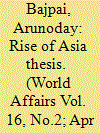

|
|
|
| 20 |
ID:
188609
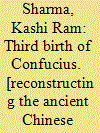

|
|
|
|
|
| Publication |
New Delhi, Manohar Publishers and Distributors, 2022.
|
| Description |
388p.hbk
|
| Standard Number |
9789391928247
|
|
|
|
|
|
|
|
|
|
|
|
Copies: C:1/I:0,R:0,Q:0
Circulation
| Accession# | Call# | Current Location | Status | Policy | Location |
| 060290 | 181.112/SHA 060290 | Main | On Shelf | General | |
|
|
|
|
|
|
|
|
|